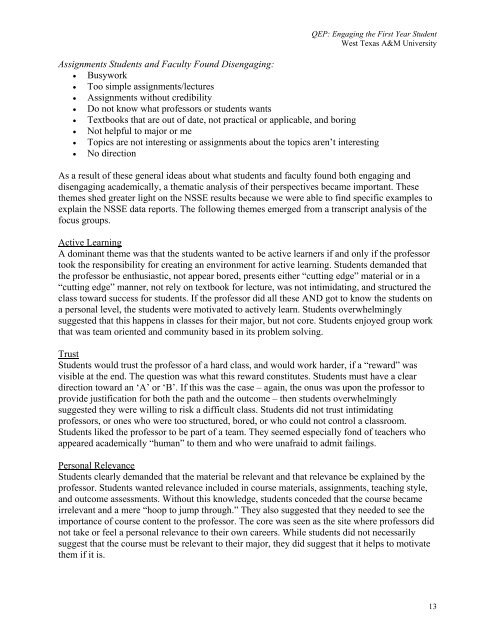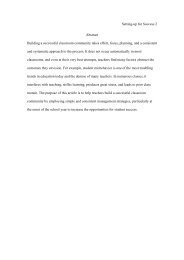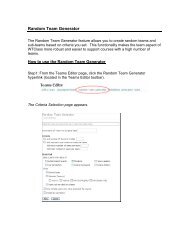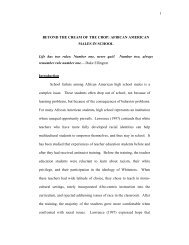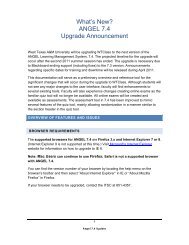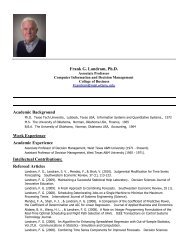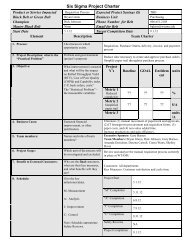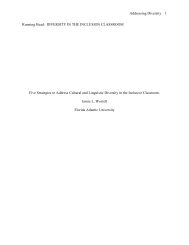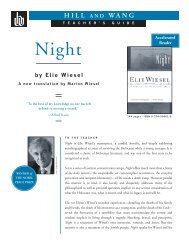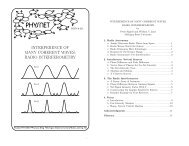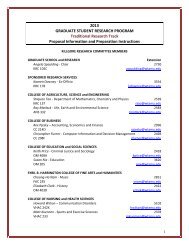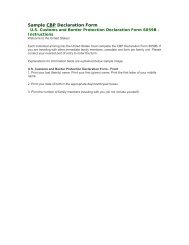(QEP) Engaging the First Year Student - West Texas A&M University
(QEP) Engaging the First Year Student - West Texas A&M University
(QEP) Engaging the First Year Student - West Texas A&M University
Create successful ePaper yourself
Turn your PDF publications into a flip-book with our unique Google optimized e-Paper software.
<strong>QEP</strong>: <strong>Engaging</strong> <strong>the</strong> <strong>First</strong> <strong>Year</strong> <strong>Student</strong><strong>West</strong> <strong>Texas</strong> A&M <strong>University</strong>Assignments <strong>Student</strong>s and Faculty Found Disengaging:• Busywork• Too simple assignments/lectures• Assignments without credibility• Do not know what professors or students wants• Textbooks that are out of date, not practical or applicable, and boring• Not helpful to major or me• Topics are not interesting or assignments about <strong>the</strong> topics aren’t interesting• No directionAs a result of <strong>the</strong>se general ideas about what students and faculty found both engaging anddisengaging academically, a <strong>the</strong>matic analysis of <strong>the</strong>ir perspectives became important. These<strong>the</strong>mes shed greater light on <strong>the</strong> NSSE results because we were able to find specific examples toexplain <strong>the</strong> NSSE data reports. The following <strong>the</strong>mes emerged from a transcript analysis of <strong>the</strong>focus groups.Active LearningA dominant <strong>the</strong>me was that <strong>the</strong> students wanted to be active learners if and only if <strong>the</strong> professortook <strong>the</strong> responsibility for creating an environment for active learning. <strong>Student</strong>s demanded that<strong>the</strong> professor be enthusiastic, not appear bored, presents ei<strong>the</strong>r “cutting edge” material or in a“ cutting edge” manner, not rely on textbook for lecture, was not intimidating, and structured <strong>the</strong>class toward success for students. If <strong>the</strong> professor did all <strong>the</strong>se AND got to know <strong>the</strong> students ona personal level, <strong>the</strong> students were motivated to actively learn. <strong>Student</strong>s overwhelminglysuggested that this happens in classes for <strong>the</strong>ir major, but not core. <strong>Student</strong>s enjoyed group workthat was team oriented and community based in its problem solving.Trust<strong>Student</strong>s would trust <strong>the</strong> professor of a hard class, and would work harder, if a “reward” wasvisible at <strong>the</strong> end. The question was what this reward constitutes. <strong>Student</strong>s must have a cleardirection toward an ‘A’ or ‘B’. If this was <strong>the</strong> case – again, <strong>the</strong> onus was upon <strong>the</strong> professor toprovide justification for both <strong>the</strong> path and <strong>the</strong> outcome – <strong>the</strong>n students overwhelminglysuggested <strong>the</strong>y were willing to risk a difficult class. <strong>Student</strong>s did not trust intimidatingprofessors, or ones who were too structured, bored, or who could not control a classroom.<strong>Student</strong>s liked <strong>the</strong> professor to be part of a team. They seemed especially fond of teachers whoappeared academically “human” to <strong>the</strong>m and who were unafraid to admit failings.Personal Relevance<strong>Student</strong>s clearly demanded that <strong>the</strong> material be relevant and that relevance be explained by <strong>the</strong>professor. <strong>Student</strong>s wanted relevance included in course materials, assignments, teaching style,and outcome assessments. Without this knowledge, students conceded that <strong>the</strong> course becameirrelevant and a mere “hoop to jump through.” They also suggested that <strong>the</strong>y needed to see <strong>the</strong>importance of course content to <strong>the</strong> professor. The core was seen as <strong>the</strong> site where professors didnot take or feel a personal relevance to <strong>the</strong>ir own careers. While students did not necessarilysuggest that <strong>the</strong> course must be relevant to <strong>the</strong>ir major, <strong>the</strong>y did suggest that it helps to motivate<strong>the</strong>m if it is.13


